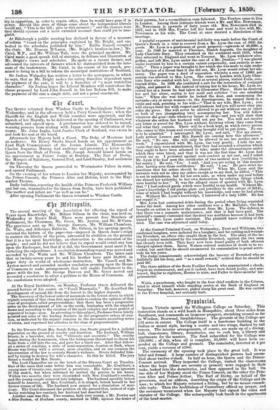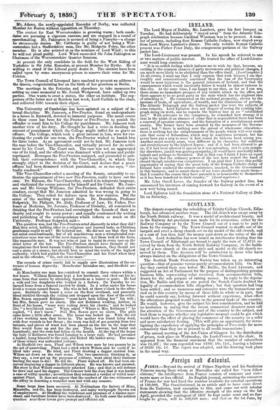Vraniurial.
Queen Victoria opened the Wellington College on Saturday. This institution stands on a wild heath in Hampshire' about three miles from Sandhurst, and commands an immense prospect, stretching around as far as Windsor, Bearwood, Strathfieldsaye. The grounds of the College are 132 acres in extent. The College itself is a handsome building in the Italian or mited style, having a centre and two wings, flanked by tall towers. The interior arrangements, of course, are made up of a dining hall, class-rooms, library, dormitories, one to each boy, a library and apartments for the masters. The fund subscribed for the College was 159,000!.; of this, when all is complete, 55,000/. will have been ex- pended on the College and grounds. The remainder, invested at 4 per cent, yields a revenue of 4200/.
The ceremony of the opening took place in the great hall. It was brief and formal. A large number of distinguished persons had assera• bled about twelve o'clock. In half an hour, the Queen and the Prince.. Consort arrived. They inspected the College, 'visited the class-rooms where the boys (there are seventy at present) were engaged in their tasks, looked into the dormitories, and then appeared in the hall. On one side of her Majesty stood the Prince Consort, on the other the Prin- cess Alice and Prince Arthur. The Earl of Derby, on behalf of the governors, read an address, describing the origin of the College and its uses ; to which her Majesty returned a fitting, but by no means remark- able reply. Then the Archbishop of Canterbury offered up prayer, and the ceremony terminated when her Majesty had signed the rules and statutes of the College. She subsequently took lunch in the apartments of the head-master. Mr. Adams, the newly-appointed Recorder of Derby, was reelected Member for Boston without opposition on Thursday.
The contest for East Worcestershire is growing warm ; both candi- dates are pursuing a vigorous canvass, and are engaged in a round of speechmaking. Mr. Pakington is accused of being a Pu.seyite—a charge he strenuously denies. Mr. Calthorpe is guilty of not being a Wor- cestershire but a Staffordshire man, like Mr. Hodgetts Foley, the other member. He is also pointed at as the nominee of Lord Ward ; to this he will not plead guilty. Lord Ward succeeded Sir John Pakington as Chairman of the Worcestershire Quarter Sessions.
At present the only candidate in the field for the West Riding of Yorkshire is Sir John Ramsden, at present Member for Ilythe. He is willing to stand if the Liberal party desire it. The electors have been called upon by some anonymous person to reserve their votes for Mr. Cobden.
The Town Council of Liverpool have resolved to present an address to the Queen, congratulating her on the birth of her grandson at Berlin.
The meetings in the Potteries and elsewhere to take measures for setting up some memorial to Mr. Josiah Wedgwood, have called up two parties. One wants to erect a statue, the other an institute. The sup- porters of the latter met at Burslem last week, Lord Carlisle in the chair, and collected 850/. towards their object.
The University of Cambridge has been agitated on a subject of in- ternal discipline. Mr. Jameson, a Pro-Proctor, found an undergraduate in a house in Barnwell, devoted to immoral purposes. The usual course in these eases has been for the Proctor or Pro-Proctor to punish the offender or remit him to his College for punishment. Mr. Jameson took another view of his duty. He thought he had a voice in deciding the amount of punishment which the College might inflict for so grave an offence. The College, which took a great interest in him, were for ms- ticating the youth for one term, the Pro-Proctor wished to banish him for three terms. As an agreement could not be had, Mr. Jameson took the case before the Vice-Chancellor, and virtually pressed for its settle- ment by his Court. The Court met. The case was not an aggravated one of its kind, and the offender was dismissed with a solemn and public reprimand. Hereupon the Pro-Proctors resigned, and proceeded to pub- lish their correspondence with the rice-Chancellor, in which they strongly object to the decision of the Court, and declare that a grave offence had been dismissed without punishment, or as one says, "vir- tually condoned." The Vice-Chancellor called a meeting of the Senate ostensibly to au- thorize the appointment of two new Pro-Proctors, really to have out the ease. Dr. Bateson, the Vice-Chancellor, stated it in temperate language, and vindicated the course pursued by himself and his Court. Mr. Jame- son and Mr. George Williams, the Pro-Proctors, defended their entire conduct, except that Mr. Jameson admitted he was wrong in going to the College. They relied for defence upon the new statutes. But the sense of the meeting was against them. Dr. Donaldson, Professor Sedgwiek, Dr. Philpott, Dr. Abdy, Professor of Law, Dr. Fisher' Pro- fessor of Medicine Dr. Teremie, Professor of Divinity, all concurred in thinking that the Pro-Proctors had overstepped the bounds of their au- thority and sought to usurp power; and equally condemned the writing and publishing of the correspondence which reflects so much on the University. Professor Sedgwiek said— The question was, had the Pro-Proctors acted discreetly in what they did? Had they acted, holding office in a religious and learned body, as Christian gentleman ought to act ? Ile believed not. He did not say that they had not acted conscientiously, bat of all mischievous men a wrongheada con- scientious man was one of the most dangerous. Let them look at the facts, like reasonable men. It was not-wise or just to insist in every ease on the strict letter of the law. The Pro-Proctors should have thought of the temptations that beset human frailty; themselves human they should not -cast a stone at a sinner, but should bear in mind the words of the highest authority, which had guided the Vice-Chancellor and his Court when they said to the offender, Go, and sin no more."
The records of crime rarely fail to supply new illustrations of the ex- tremes of human depravity. Manchester furnishes one, and Sheffield an- other.
At Manchester one man has contrived to commit three crimes within a few hours. William Robinson kept a low beerhouse and eked out his in- come from that source by attending funerals as a bearer or mute. Ire had .a wife and two daughters who worked in a factory. On Tuesday he re- turned home from a funeral excited by drink. In a cellar under his house lived a woman named Saxon. She was in bed at three o'clock in the after- noon. Suddenly Suddenly she heard a noise on the floor overhead, and presently blood trickled through the ceiling, and dropped upon the floor of the cellar. Mrs. Saxon supposed Robinson must have been killing her" his wife ; but Mrs. Saxon gave no alarm. She saw Robinson walking, hatless, in front of his house, "tears were rolling down his cheeks," and he looked like "a bewildered man." When asked "Where is Mrs. Robinson ? " he replied, "I don't know." Still Mrs. Saxon gave no alarm. The girls came home a little after seven. The house was locked up. With the aid of two working men they broke in. The mother was found lying dead, With four wounds in her throat ; the room was full of gas pouring from two burners, and pieces of wood had been placed on the fire in the hope that they would flame up and fire the gas. They, however, had burnt out harmlessly, and the ends had fallen on the hearth. At the top of the house -the body of Robinson was found hanging to a large nail, Re had ascended a ladder, hung himself to the nail, and kicked the ladder away. The cause of these crimes was unfounded jealousy. At Sheffield two men, Plant and Wilson were seen by two passers by in the act of quarreling. Plant had a stick which Wilson said he could if he hired take away. He tried, and Plant drawing a dagger stabbed him. Wilson sat down on the curb stone. The two spectators, thinking it, as they say, a row got up for purposes of robbery, went about their business leaving the man to die! He did die. Plant walked off. He had been ob- served displaying a dagger in different places. He was known and arrested. His story is that Wilson causeleesly attacked him ; and that in self defence he drew and used his dagger. The Coroner told the Jury that it was hardly a case of wilful murder ; nevertheless they returned a verdict of wilful mur- against Plant. It does not appear that the conduct of the two witnesses of the affray in deserting a wounded man met with any censure.
Some large fires have occurred. At Nottingham the factory of Hine, lifinalella, and Co. has been destroyed, and many workpeople thrown out of employment. At Sheffield the warehouse and premises of a timber-mer- chant and furniture broker have been destroyed. In both cases the soldiers quartere near these towns gave prompt and efficient aid.



































 Previous page
Previous page